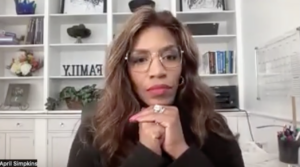
This Interview contains conversation about depression and suicide. If you or someone you know is dealing with depression make sure you encourage them to seek professional help. If you or someone you know is having suicidal thoughts you can call or text the 988 Suicide & Crisis Lifeline at 988. The Lifeline provides 24-hour, confidential support to anyone in suicidal crisis or emotional distress.
This interview is published in honor of World Mental Health Day. You can find April Simpkins co-authored book with her late daughter Cheslie Kryst, here.
—
Maina
Ms. Simpkins, what a powerful book. And so I’m asking this question with all sincerity. I’ve been there before. How are you doing?
April
You know, I take a temperature check on myself. And my mental health on a regular basis. Right now, honestly, out of a 1 to 5 scale, I’m a 4, which is OK. And that’s a good place. Good place. You know, losing a child is just hard. It’s just one of those things I pray that nobody goes through.
Maina
You said that she had high functioning depression. Can you explain that term to me because I think some of people may not understand that term?
April
Sure, I think most people are familiar with the term major depressive disorder. And we see that it will take over. That is when you see someone really struggling. They’re fatigued. They’re not eating. It shows in their facial expression. There are so many outwards visual appearances to having major depressive disorder. But what Cheslie had was persistent depressive disorder, which is a little different. And persistent depressive disorder shows several of the symptoms of major depressive disorder. But they’re not as critical and they don’t go away. I think for many of us who have gone through a trauma or a change that took you over, that maybe weren’t expecting, you will feel the emotion of depression. It’s the natural emotion. We all feel that.
Maina
We all go through it, yes.
April
Exactly. But that’s the key word is that we go through it. With Cheslie, she lived with it. And was still able to function. And that’s one of the challenges with persistent depressive disorder is you will think to yourself, it’s not that bad. I can still do these things or I’m still able to do these things. And that is where it gets its hybrid name, high functioning depression. I had not heard that term before. And so, I was like, that is really deep. And it made me lean into friends and family members who are in that category. Because we usually see the other side [of depression] and not this side.
Maina
Cheslie’s Foundation. How did that come into play? How’s that going?
April
Cheslie was one of the most giving people ever. Even now, I still hear stories of things she did for others. And it teaches me so much. As a matter of fact, I was just in New York on Friday and talked with a young woman who said that Cheslie had read over one of her essays she had to write for college and gave her a few tips. There are people who I know Cheslie has given them some encouragement on becoming an attorney and words of support and taking the bar exam. When she was in law school and, of course, getting her MBA simultaneously and just involved in a plethora of other organizations, she still found the time to mentor at-risk teens. And would go, I remember vividly, when she skipped a family event, which for us is sacred. But skipped a family event because she wanted to go to the graduation of one of the young women that she mentored. Cheslie gave. And she did it without boasting. She didn’t do it to win awards or anything. She did it because that was the essence of who she was. And this, for me, in my mind, is always going to be Cheslie’s book. And what do I do with what comes of her final work? And that is to allow her legacy to live on and doing that through the spirit of giving. And so, all the net proceeds from the book will go into the foundation. And then we will, in turn, send that money back out to other nonprofits that are focused on the mental health and wellness of youth and teens, our young adults and teens.
